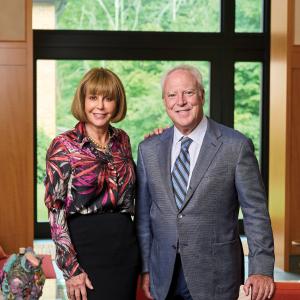Transformative gift brings new hope
Shortly after being named co-lead of the cancer genetics program at Case Comprehensive Cancer Center in 1996, Sanford Markowitz, MD, PhD, received a letter from someone he had never met. Inside the envelope was a message from noted philanthropist Leonard Horvitz wishing Markowitz luck in his cancer research efforts—as well as a check for $100,000 toward his work.
This initial gift marked the beginning of a nearly 30-year friendship between Markowitz and the Horvitz family, first with Leonard and then with his son, Richard. Over the years, the Horvitz family has made several multimillion-dollar gifts to support Markowitz’s research, leading to a series of significant scientific breakthroughs in cancer diagnosis and treatment.
“Their many years of philanthropy have allowed us to pursue bold and unconventional ideas. It’s been transformative for my research program and has led to major breakthroughs for patients,” said Markowitz, who is now the Ingalls Professor of Cancer Genetics at the School of Medicine and an oncologist at University Hospitals Seidman Cancer Center.
Now, thanks to the continued generosity of Richard Horvitz and Erica Hartman-Horvitz, Markowitz and Amitabh Chak, MD, professor of medicine and oncology at the School of Medicine, are working to detect gastrointestinal cancers before they become lethal. Gastroesophageal reflux disease affects about 20% of the population in the United States. If left untreated, the chronic condition can lead to Barrett’s esophagus, a precancerous change in the cellular structure of the esophageal lining that significantly increases the risk of esophageal cancer—the sixth most common cause of cancer deaths worldwide.
Because esophageal cancer often goes undetected until advanced stages—and only 20% of patients survive five years after their diagnoses—early detection is key.
Markowitz and Chak partnered with Joseph Willis, PhD, professor of pathology at the School of Medicine, to develop new technologies—EsoCheck and EsoGuard—that could improve early detection and treatment of Barrett’s esophagus and reduce the high mortality rate
associated with the disease.
EsoGuard is a DNA test that accurately detects the presence of esophageal precancer, while EsoCheck is a swallowable device for non-endoscopic sampling of the esophagus that retrieves the precancerous cells and their DNA. Together, these tests can be performed in an office visit in less than five minutes.
Clinical trials are underway to determine their effectiveness, but one thing is already clear: None of it would have been possible without the Horvitz family.
“Richard and Erica are true supporters of research,” said Chak. “Without [them], we would never have accomplished any of the things we have been able to do.”
Horvitz emphasized the importance of philanthropy to medical discovery. “We’re in the Golden Age of medicine,” he said. “Without philanthropy, progress will wither.”
He urges others to consider the long-term impact of their gifts, noting that they are an investment in future health and well-being.
“Medical research is one of the most important causes we can support. It has the power to save lives and transform the future.”
Originally published in the summer 2025 issue of Forward Thinking magazine


